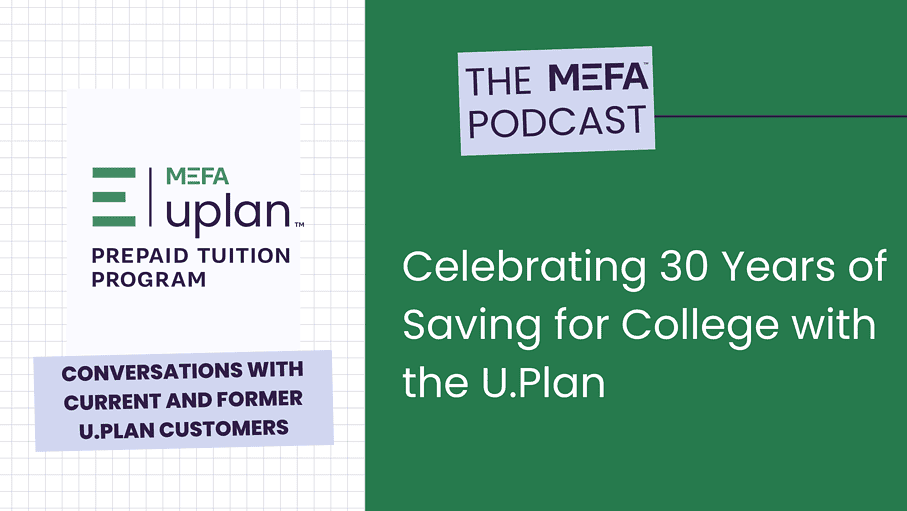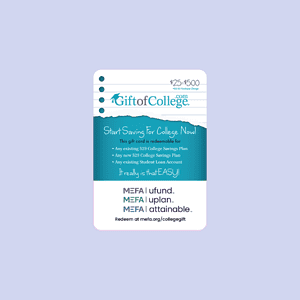Resources Mentioned in this Episode
Paulette Glasser: [00:00:00] To hear it’s not too good to be true. It really is as good as it sounds. It sounds like it’s even easier to use. Now. You can have a list stuff taken out electronically. You can send money all year long, and then it’s put aside at a certain time. It just, it’s, it really is. It’s so easy to use and it really is just the most amazing program, and people should at least look into it. They owe it to themselves to look into it.
Jonathan Hughes: Hi everyone, and welcome to the MEFA Podcast. My name is Jonathan Hughes, and on today’s show, we are marking the 30th anniversary of the U.Plan. The U.Plan is Massachusetts’s prepaid tuition plan where you can lock in tomorrow’s tuition at today’s prices and guard against the increase in college tuition.
It’s really the only way that you can arguably keep the cost of tuition from going up over [00:01:00] the years. And you’re going to hear from three satisfied new plan customers who will hopefully convince you how good the program is. Something that you’ll hear from them, or something that you’ll hear a few of them say to you is that the U plan guards against inflation and against market volatility.
And I think those things have really. Helped the U.Plan thrive throughout the past 30 years. So we are really proud of the program and personally, I feel some affection for it because I worked so closely with the accounts for many years. And that might sound odd, but it’s not really because as you’ll see, and you’ll hear from these parents, the U.Plan.
A lot of fans among those who know it. So I will be back after the segments wrap things up. I want to say once again that all statements made by our guests are their own words, not ours. So without any further ado, let’s meet our parents.
Paulette Glasser: My name is Paulette Glasser. I’m a U.Plan Saver, and we had three accounts [00:02:00] in our house.
Stephen McWhirter: Hello Stephen, From Hamilton Massachusetts of course, but and I have two children that went through the U.Plan process. We enjoyed it very much. If you can enjoy paying college tuition it could be painful, but, we actually had a very good experience.
Vijay Arjunan: Yep. My name is Vijay Arjunan.
I’m from Chelmsford, Massachusetts. I have two boys. My elder one is 23. In fact he is going to graduate tomorrow from Northeastern.
Jonathan Hughes: Congratulations.
Vijay Arjunan: Thank you very much. But for, U.Plan? I don’t think okay. Would’ve been my elder one would’ve been going, would’ve gone to Northeastern would’ve been looking at some other options. And I have a younger one who is a junior in high school in Chelmsford High.
Jonathan Hughes: How many U.Plan accounts do you have? Do you have one for each of your kids?
Vijay Arjunan: Yeah. I have two U.Plan accounts one for my elder, one another for the younger one.
Jonathan Hughes: How did you hear [00:03:00] about the U.Plan?
Paulette Glasser: Before my husband and I had kids, I said to him, we need to figure out how we’re going to save for them to go to college.
And my husband said they are going to pay for themselves just like I did. And that sounded like a really bad idea to me. It was 1995. My son, Darien was literally three days old. And there, was a commercial for the U.Plan on television and I had no idea what it was, but it seems like a really good thing.
And I didn’t really understand how it worked. It was talking about locking in tomorrow’s tuition at today’s rates, and I just thought it was something to look into. Looked into it. I couldn’t find a downside. I just couldn’t find a downside to it. And so that was what we went with. So Darien’s 29 now, and literally he was three days old in 1995 when I saw this commercial for the U.Plan and it’s been the greatest thing in the world.
Vijay Arjunan: Basically in once my elder one was born in 2002, I started doing some research in terms of which is a better option for us. And one of my friends introduced me to U.Plan at that time. I think it’s, it was little still at this [00:04:00] nascent stage.
Stephen McWhirter: Two children, a daughter and a son, and about 10 years before they were going to college I entered into the U.Plan, set the accounts up. It was fairly easy to do that. Didn’t really have a great idea what to expect other than. All the thing that rings in your mind is, the tuition is frozen at the university.
Looked at the list, there’s a New England list. It’s pretty comprehensive. It’s all, this is all more, going to college is more psychological than financial. And you want to begin to set the stage of, okay, take action, which is funding it. And the funding of it is that you want to make sure they get started.
And you look at the colleges. And as you can see, the variety of colleges, that gets you more enthusiastic. It takes away some of the fear or the apprehension, the teach the parents have.
Vijay Arjunan: I come from a Asian Indian [00:05:00] family where education is like is sacrosanct in our culture. Like basically you can go without food, but not education. So start saving at a very early in stage in life okay, my parents did that and I saw that. By the way, like I’m an electrical engineer with a Master’s in business administration and, when I finished college, my school, I came out with no debt. One. And when I moved 25 years ago when I moved to Boston and then like I started working with my colleagues and start talking to them, I found out that okay, what a huge advantage that is. What my parents had given to me. And in my opinion, that’s yeah, generational debt that I need to pass on like that by repay that, by paying to my saving for my kids.
Jonathan Hughes: What did you find attractive about the, that U.Plan?
Paulette Glasser: It seemed too good to be true. Frankly, it just seemed too good to be true. You put the money aside, you save a percentage of the tuition and fees, and if your child decides not to go to [00:06:00] school in Massachusetts or chooses not to go to one of the, I think there are over 70 colleges and universities to choose from, then you get your money back with interest.
Stephen McWhirter: And one tricky thing for parents. What if my child goes to school down in DC and we had some neighbors where their children across the street where their children went to DC. But what happens there is the U plan at that point is in a bond and it accrues interest, just like you’d have it in fixed income and at the point where it matures, then you can take it out.
And the big thing about that is you take it out. He needed to use it for. Institution outside the preview of the U.Plan is that it comes out and they don’t penalize you, they don’t tax you, and you can use it for that institution. It avoids inflation and it also avoids market risk.
Vijay Arjunan: In my opinion this is inflation protected certificate of deposit. If you can call it as one in one way, because your [00:07:00] principle is protected. You are also locking in your tuition fees at the, like at that rate that like at which you are paying. There is this tax advantage for the earnings that like that is coming.
One which is basically no mass of federal taxes. And on top of it, like the number of schools which is participating in this one, like what, like now it has become 70 plus schools, amazing number of options that is available. So at one point I was even thinking to say, Hey, this is, this sounds stupid one and but it’s true also.
Stephen McWhirter: The worst thing parents want is two to three years before their kids going to college, we have inflation and people would say for 10 years, oh, that will never happen. And then the other thing would be that, the market crashes. Three or four years ago, people would say that will never happen. And we have both.
Vijay Arjunan: See, in 2020 during the COVID year, the market tanked, all the 529 plans and everything.
Like it was one okay, took a hit. And that [00:08:00] is the exact time we were deciding for his school for in 2021. And, the advantage which you plan brings is your principal is protected. So you I can sleep peacefully when it comes to my kids’ college education because, the your the CPI interest okay, the inflation is protected, like your tuition fees is locked, and on top of it, your principle is a hundred percent protected.
It is protected from the market vagaries. You cannot get anything better than that’s any of the plans, in my opinion.
Jonathan Hughes: What was your strategy going in investing?
Stephen McWhirter: I used it as an estate plan because I said, geez, what happens 10, 15 years from now? What happens to, to my wife or I, or both of us? This is a framework that’s set that the children know, there’s a strategy where I fronted the first year so that, to make sure to get them started. And then maybe at the end a little more just to make sure they can finish off and then fill in.
Paulette Glasser: Any birthday Christmas. If [00:09:00] their grandparents were going to give them something, I would say, please give them half of it in a check, and I will put that in their U.Plan accounts. And it was the best thing we ever did.
My husband’s parents were originally reluctant. They wanted to buy our kids savings bonds, if they were going to buy them anything. And I said to them, listen, if this thing works the way that I think it’s going to work, we’re going to get way more bang for our buck if we invest in this program. And we did and we did. It was amazing.
Vijay Arjunan: I also have two new fund accounts because the new plan covers the tuition part of it. And then like for the other we thought okay, we’ll save, have the 529 account. And so we have, I have set it up for. A smaller piece, but majority the big part of it, the savings is in the U.Plan.
Jonathan Hughes: So how did you actually find the process then of setting up the account and making the contributions? How did you do it and did you find that process easy?
Stephen McWhirter: Yeah, it was just called the one, 800 hundred number. Identify myself, figure out [00:10:00] how to get the payments to them. They set the account up and we funded it.
It was like 1, 2, 3, or A, B, C. As far as customer service and ease. I would put them in the 99%.
Paulette Glasser: Back in the olden days. We had to call MEFA and the people there were always helpful and always so nice, and they would send me papers to fill out and I would send them back. But it was pretty straightforward if I had any questions, they were a phone call away if I had questions. And making the contributions was the same thing. You had to mail in a check. I’m sure things can be done electronically now. I just felt comfortable dealing with the people at MEFA. They were wonderful, and that was how we finished out the whole process.
Vijay Arjunan: It used to be during those days, like I started like in mid two thousands, one those days okay, only a certain time of the year that you can fund it, but now like you’ve changed that also, like basically you can fund it at any time of the year. It was very easy.
Jonathan Hughes: Between putting the money in and between getting the money out and all that stuff, were you able to keep tabs on it or did you not worry about it [00:11:00] too much until it came time to use the funds?
Paulette Glasser: As I was saving, I paid close attention to it because as soon as I hit a hundred percent, UMass Lowell was the school I focused on, because that was closest to us.
But really they could have gone to any of the UMass schools. The tuition was so close at, one or the other. But as soon as it, I decided to save year by year. And so once a hundred percent was hit for their freshman year, I went right to the sophomore year, and that was what I kept tabs on. MEFA always sent us statements to let us know where things stood.
Stephen McWhirter: As, as far as the accounts, I didn’t treat them any different than another, any other investment that our family had. And I didn’t watch them grow. I think they sent the amount and stuff like that. It, it was, the minimum or are not of even a concern because frozen tuition is frozen tuition.
Vijay Arjunan: The report which you gimme okay, it gives me goosebumps. Okay? Let me tell you this, the end of the year report, which says you have saved this much percentage for [00:12:00] year one, for year two, year three, year four, in so and so school. When I was talking to my kid, my elder one who was just finishing, I was telling him that okay, this is how okay, we have saved for your college and this is how, like we tracked it year after year, and I even made a spreadsheet and then okay. Tracked it through that with him. So it was a huge motivation for you.
Jonathan Hughes: Did having the funds in the U.Plan play any role in the decision that your children made in which college?
Stephen McWhirter: No.
Jonathan Hughes: And did they know that you were saving in the U plan for them?
Stephen McWhirter: No. And if they did, they could care less.
Jonathan Hughes: When it came time to use the funds. Was that easy to do?
Paulette Glasser: This is when I thought to myself, let’s see if I made a good choice. And, I literally had to I called the people at MEFA to let them know that Darien was signed up to go to UMass Lowell. And they literally just took care of the whole thing for me.
Vijay Arjunan: Every [00:13:00] semester. Once I get the bill. Immediately okay, go into MEFA and, very simple website. Very simple. Not complicated at all. There was never an instance where I was worried or concerned that okay, hey will it reach on time? Or do I have to fund myself? Or things like that. And not even once.
Jonathan Hughes: How did you end up using your U.Plan accounts for your children?
Stephen McWhirter: To pay tuition.
Jonathan Hughes: So they did go to a participating college? Yeah.
Stephen McWhirter: It worked so well that we had extra money because we didn’t have to use some of the other money that we put aside for the children’s education.
Jonathan Hughes: So you used the U.Plan for each of your children, and how did you end up using the funds?
Paulette Glasser: I tried to be very realistic, so I know that there are tons of universities and colleges that the kids can choose from for the U.Plan. Realistically I thought I could save for a state school and the deal I made with my kids was if you go to a state school [00:14:00] here in Massachusetts and you uch, you will graduate debt free.
And they all did their part. They could have gone to fancier schools or whatever, but that’s what they all did. They all chose to go to UMass Lowell and that’s what I was able to save for. And they all graduated owing zero in, they had no college debt. It was fantastic.
Jonathan Hughes: But you said earlier too in our conversation that they’re debt free, right?
Stephen McWhirter: Yes. And they were able to go study abroad. One went study abroad, so all of Europe and got out of college and was like 90% ahead of all of their peers. Then they really realized the value of what. I guess the parents did and the U.Plan did.
Paulette Glasser: So my son Darien, who graduated from UMass Lowell in 2018 now works at Meta
and actually loves telling his coworkers that he went to a state school [00:15:00] and he really appreciated what we were able to do for him. My son Nicholas, graduated from UMass Lowell in 2020. In the middle of the pandemic.
So he was debt free. He chose to get his master’s at that point, and he did an accelerated program at UMass Lowell. It was about $15,000 and he did pay for that himself because we said we can do the four year degree for you, but he was able to pay it off easily and that was the only debt he had. And he works at a great company up in Wyndham, New Hampshire.
Now, we bought a house last year and he’s doing very well. And my daughter Mallory, graduated from UMass Lowell with a world languages degree and she is currently living in South Korea. Living her best life.
Jonathan Hughes: And I have to ask, you told us so many great things about how your account worked out with your older child.
What about your younger child?
Vijay Arjunan: Great question that you asked. It’s he’s a junior in high school. Oh, okay. And one reason I’m not too concerned about the financial aspect of the school’s note is, is the you plan today that we have [00:16:00] saved for him today? We are more focused on which school and what subject one and the financial aspect is the last thing in our it is there, but like it is the last thing in our mind.
I don’t think like the situation would’ve been possible without the discipline of saving in U.Plan.
Jonathan Hughes: Is there anything else that you’d like to say about the U.Plan specifically before we go for anyone to hear?
Paulette Glasser: It’s not too good to be true. It really is as good as it sounds. It sounds like it’s even easier to use now, and you can have stuff taken out electronically.
You can send money all year long, and then it’s put aside at a certain time. It just, it’s, it really is, it’s so easy to use and it really is just the most amazing program and people should at least look into it. They owe it to themselves to look into it.
Stephen McWhirter: Thank you for your program. I’d encourage anyone to use it. You really helped a lot.
Paulette Glasser: So the biggest problem I have, the biggest complaint I have with the U.Plan is that people don’t know about it. I’m a dental hygienist. I have talked to my patients about this for years and. I think [00:17:00] people really just don’t believe it’s as good as it is. It really is.
Vijay Arjunan: I will put it this way. There is no selling that happened or anything. It was purely like, okay, we did it. One and you plan enabled it. We’re so grateful for that. I’m very clear I’m going to do this for my grandkids. And so any grandparents are parents to like start, look at looking look at this u plan as an option. This is probably one of the best in the country today.
Jonathan Hughes: I’m really happy that you had such a great experience and I don’t think I can ask anything else of you in terms of, saying nice things about the U plan.
Vijay Arjunan: No I absolutely it’s not just nice things like it’s I really mean it.
Okay. I really, absolutely mean it. From the bottom, my, my heart. I I was able to replicate what my parents did to me. They paid for my education, and that has what huge advantage for me in my life. That’s when I was able to start a family, buy a house, all of that without the worry of paying a student debt.
But the same thing okay, I’m able to do it [00:18:00] for my son. That is, that’s really big for me and my wife. Thank you so much. Thank you. Thank you, Jonathan.
Paulette Glasser: Thank you so much, Jonathan. Okay.
Jonathan Hughes: All right, everyone. That was our show. I would like to thank Vijay, Stephen, and Paulette for joining us and sharing their time and their experience, and talking about the U Plan so that you all can hear it. And if you liked what you heard on the show today and you want to hear more from us, then you can follow the show and you can do that wherever you find your podcast.
And please remember again, to rate and review us, helps us to keep doing what we’re doing and getting this show out. I would like to thank Shaun Connolly, our producer. I’d like to thank Meredith Clement, Lauren Danz, Lisa Rooney, Christina Davidson, and AJ Yee for their assistance in getting the show posted.
[00:19:00] Once again, my name is Jonathan Hughes and this has been the MEFA Podcast. Thank you.












